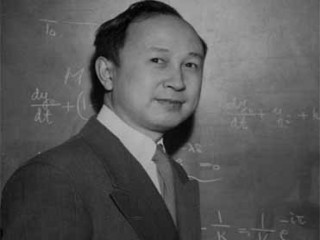
Tsien Hsue-shen biography
Date of birth : 1911-12-11
Date of death : 2009-10-31
Birthplace : Hangzhou, China
Nationality : Chinese
Category : Science and Technology
Last modified : 2011-12-20
Credited as : scientist, Founder of Chinese space program, father of modern Chinese rocketry
0 votes so far
Tsien Hsue-shen is regarded as the father of modern Chinese rocketry. He was born in China but came to America as a young man. He studied under Theodore von Kármán, and became one of America's foremost experts on rockets and high-speed flight theory, and a co-founder of the Jet Propulsion Laboratory. In the preliminary planning for what became America's space program, he met countless times with US military officials and scientists, and at the end of World War II he was deeply involved in Project Lusty (from Luftwaffe Secret Technology), which had Tsien entering fallen Germany with American troops to secure key documents and personnel from the German aircraft and rocketry programs.
In 1949 Tsien applied for US citizenship, but in the American political atmosphere of McCarthyism, a top-level Chinese scientist was viewed with increasing suspicion. On 6 June 1950 federal agents came to Tsien's home and accused him of spying for the Red Chinese. Tsien and his colleagues protested that the allegations were nonsense, and indeed, the most damning evidence against him -- purportedly a list of security codes -- turned out to be a table of logarithms written in Chinese. No substantial evidence against Tsien was ever presented, but his security clearances were immediately revoked, and he was held under virtual house arrest for more than five years.
He was deported to China in 1955, without any of his scientific papers or books. There he resumed his career, working among scientists whose command of technology was years behind American scientists, although by then -- after years out of touch with scientific advances -- Tsien's own expertise was also out of date. Given a position of authority in Chinese science, he sent young Chinese scientists to study at the best universities in Russia, and oversaw the rapid development of electronics, machinery, and metallurgical industries in an otherwise largely agrarian society.
Under Tsien's leadership the Chinese developed the R-2 missile (1958), DF-1 missile (early 1960s), and CZ/DF-5 intercontinental ballistic missile (1971). In 1968 he established China's Space Flight Medical Research Center, beginning China's manned space flight program. In 1970 a Tsien-developed rocket put China's first satellite into earth orbit, and in 1978 his Tsien Spaceplane entered service. He is a first cousin, once removed, of Nobel laureate Roger Y. Tsien.
In his later years, since the 1980s, Qian advocated scientific investigation of traditional Chinese medicine, Qigong and "special human body functions". Some people claim that Qian actually did not spend his effort[clarification needed] on qigong, but that he just expressed that people should consider the widely practiced qigong in a scientific manner. He particularly encouraged scientists to accumulate observational data on qigong for the establishment of future theories.
From the early 1980s to now,He studied in a number of areas, and created systematics, Contributed on Marxism, science and technology system and somatic science, thinking science, natural sciences, engineering science, literature and art, military science, systems science, geography science, social science, education,etc .He is good at the achievements in various fields of science-rich systems, but also the vision of science through the system proposed by the new field. Advanced the concepts, theory and method on system science: open complex giant system, from qualitative to quantitative integration of Hall for Workshop of comprehensive and integrated system, and opened up a Chinese school of the Science of Complexity. Organizated scientific seminars and train successors.
In 2008, he was named Aviation Week and Space Technology Person of the Year. This selection is not intended as an honour but is given to the person judged to have the greatest impact on aviation in the past year.In 2008, China Central Television named Qian as one of the eleven most inspiring people in China. He died at the age of 97 on October 31, 2009 in Beijing.
In July 2009, the Omega Alpha Association named Qian (H. S. Tsien) one of four Honorary Members in the international systems engineering honor society.He used his whole life to serving the people,and persist to study with the guidance of Marxism. “A Marxist will never not love the people and his motherland.”
















